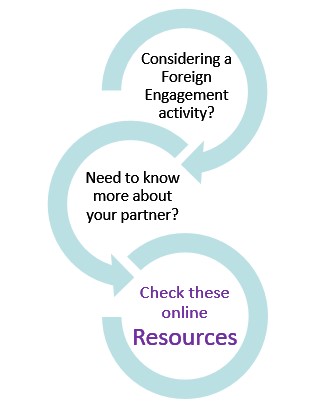About Your Foreign Partner
What do you know about your foreign partner?
The online resources listed in the table below can be used to find details about the institutional or political/economic context in which your foreign partner operates. These resources can assist in creating a profile for due diligence purposes or to help determine whether an entity or individual meets the criteria under a foreign engagement compliance scheme (e.g. arrangements requiring registration under a scheme, an application for a permit, a detailed review of the terms of contract, additional internal assessment and approval). You should always know your partner before proceeding with a foreign engagement activity.
Check to see if the University has an existing international partnership or agreement using the International agreements database.
Individual engagement risks
Even new 1:1 engagements with new foreign colleagues require additional attention, particularly if you are not familiar with the individual's background or their home organisation. The Australian Security Intelligence Organisation (ASIO) has prepared an Online networking resource to raise awareness of individual engagement risks.
| Resource | Description | For information about: |
|---|---|---|
Institutional autonomy in international universities |
||
| Asian Development Bank | Institutional Governance and Management of Public Higher Education Institutions in Southeast Asia. |
|
| The Academic Freedom Index |
The Global Public Policy Institute (GGPi) ranks the status of academic freedom in 175 countries from A to E based on aggregate data. GGPi is an independent non-profit think tank based in Berlin funded by various foundations, governments and the UE and UN. |
|
| The China Defence Universities Tracker | 160 Chinese institutions engaged in military or security-related science and technology research assessed by the Australian Strategic Policy Institute’s International Cyber Policy Centre with funding from the US Department of State’s Global Engagement Center. |
|
| The Foreign Arrangements Scheme Public Register | This searchable register lists foreign arrangements notified to the Australian Minister for Foreign Affairs under the Foreign Arrangement Scheme. Any foreign university or research institute listed because they meet the “lack of autonomy” criteria would indicate that any proposed arrangement must be notified under the Scheme. The Register is maintained by the Department of Foreign Affairs and Trade. |
|
| University Autonomy in Europe | Compares 29 European higher education systems. The resource is published by the European University Association which is a representative body for the higher education sector. |
|
Country / government / agency profiles |
||
| Wikipedia - Government agencies by country category | An online encyclopaedia edited by Wikipedia users. |
|
| Global Edge | Online global business resource providing various country-based indicators and rankings. The resource is published by the International Business Center and the Eli Broad College of Business at Michigan State University. It is partially funded by a U.S. Department of Education. |
|
| World Bank Governance Index | Comparative measure of the effectiveness of a country’s governance. The index is based on aggregate data to create indicators of the way a country and its citizens are governed. |
|
| Corruption Perceptions Index | Ranks 180 countries and territories according to risk of public sector corruption, as perceived by a range of experts and business people. |
|
Australia's perspective on the world |
||
| DFAT Country Briefs | Profiles 240 countries – the people, history, government, political conditions, economy, and foreign relations |
|
| DFAT Travel Advice website (Smartraveller) | Up to date advice on significant changes in overseas destinations |
|
| Austrade | Supports connections Australian and international businesses |
|
| Defence and Strategic Goods List (DSGL) | Database managed by Defence Export Controls (DEC) listing restricted export activity |
|
| Australian Sanctions Regimes | Restrict foreign engagements with prescribed countries, governments, groups or individuals associated with these entities. |
|
| Australia’s Foreign Policy White Paper (2017) | Australian Government’s position on foreign relationships and international engagement. |
|
Note: you should consult a number of sources if you are relying on these resources alone in compiling a due diligence background check for a foreign entity. Seek assistance if your findings raise any concerns or queries.

